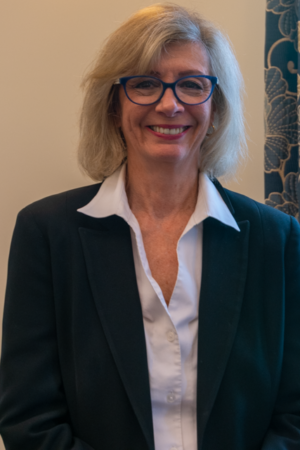Denise Cesaero reflects on 30 years as ElderHouse’s executive director

Denise Cesareo said she is both excited and sad to be retiring from her role as executive director of ElderHouse after 30 years on the job. The Norwalk-based not-for-profit adult day center provides seniors with community, engaging activities and medical supervision during the day before returning them to their homes.
“Adult day service was very new 30 years ago when I came into it,”Cesareo recalled. “I have a master’s degree in education and I had worked in childcare, setting up a childcare center and those skills seemed to translate very well into adult day services in that you take a group of people, be it kids or adults, you bring them in for the day and you make their day absolutely wonderful, and you want to make them come back the next day.”
Similarly, diverse people with disparate needs and interests can be expected to show up in both settings. The key distinction, according to Cesareo, is that providing service for children includes consideration of their increasing levels of independence whereas aging adults typically become more dependent on others as they deal with aging diseases.
“But both populations are at risk,”Cesareo noted. “You can’t leave children home alone, and for some of our adults they would not be safe if they were left home alone day after day…”
That basic principle has been the guiding force behind the organization since its founding.
“Our mission is the same as when I first started here 30 years ago,”Cesareo said. “Maybe it was written a little differently, but it is still the same in terms of our job, which is to keep people in the community, in their homes and out of premature placement in nursing homes.”
“Truthfully, nobody wants to be in a nursing home, nobody wants to be in institutional care,”she added. “We knew there was something better. We knew that if we could provide something during the day and we could send people home to their caregivers in the evening we could keep people living in their homes, in their communities, with their families. We believe people are better off, happier, with more quality of life when they are living in their own homes with their families.”
What has changed since she started is that people are living longer and posing different challenges.
“When I first came here the average age of a client was 76. It is now 82-and-a-half,”she said. “So, we’re spending a lot more time with people who are in their nineties and over a hundred. We have more clients in their nineties than ever before.”
Further changes to their approach proved necessary in the past few years as facilities working with the elderly took pains to ensure safety during the Covid pandemic. Cesareo described the challenges of being able to only have one client on the bus at a time, helping people with memory issues understand why they were wearing masks they don’t remember putting on, and the disruptions to routines, which people had built their lives around.
“There were caregivers who were unprepared to take care of a person with Alzheimer’s 24/7,”Cesareo recalled. “We shut down for a couple months because we had to, but we reopened as soon as we could, because we had to relieve that caregiver, even if they came for only a couple hours because that caregiver needed a break.”
ElderHouse turned out to be a truly essential organization, keeping individuals out of expensive and Covid vulnerable nursing homes, making it possible for those with older loved ones to focus on other tasks, and proving to be a meeting point for a vulnerable segment of the community.
Cesareo said that owing to the talented people she worked with and a board of directors whose excellent fundraising has made it possible to offer truly affordable services she is confident in the continued success of ElderHouse.
“I’m still as passionate today as I was 30 years ago when I walked in that door, because I know the work is amazing,”she stated. “The staff is marvelous, everything’s working really, really well. So, it is a good time to hand it over, but it’s a bit like my child ”” ”˜Here take care of it!’ But I am very prepared, and I think as an organization we are prepared to take the next step.”